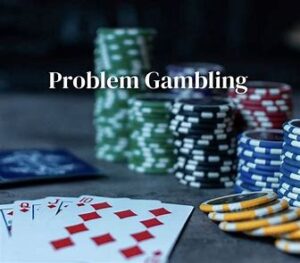
The high level of unemployment in the country means that a lot of the teeming youths are seeking more avenues to augment their income sources and meet their daily needs. A lot of these youths have found gaming operations to be a source of making extra revenue by engaging in one form of activity or the other in the gaming industry. Operators like PLL (Baba Ijebu), R &S Lotto, Bet9ja, Naira Bet, BetKing, etc has provided ways for people especially the youths to make extra income, either as field agents or shop assistants/runners etc, for their gaming operations.
However, with the positive side of keeping people occupied with micro businesses and other money generating mini jobs in the industry, comes the hidden danger of problem gambling. With the federal legalisation and rapid expansion of Sports betting and other online betting games, including the unlicensed betting sites operating in the Nigerian space, the danger of gambling addiction looms higher now more than ever. This danger pertains to every at- risk gambler but it’s really high amongst the youth, who are more susceptible to problem gambling.

Problem Gambling
The Nigerian gambling or gaming Industry as preferred, has witnessed rapid expansion in recent times, both in penetration and revenue generation, which is mostly due to the rise in technological advancement, the increased promotion of the financial opportunities in gaming activities and the de-stigmatisation of gambling by the industry stakeholders and the media.
In this digital age, young players are more susceptible to gambling harm, because they are more inclined to gamble in a harmful way. Gambling problems among the youths is right there alongside drug and alcohol addiction, and the cost on them is harder to calculate because the dangers are often indirect, intangible and hidden; because unlike other addictions, it is not easily recognisable, until it is too late.
It has economic, social and emotional impact on the players, their families, employers and the community. It is easy to report that the Nigerian gaming industry is a $72 billion market; that in 2016 alone, Nigerians spent an estimated N154 billion on betting, that Nigeria currently ranks 2nd in Africa in terms of gambling revenues etc.
it is all positive news for the economy, however, the question remains, what efforts are those invested in the industry making, to protect from harm those on whose backs and funds, these reports are made possible, especially the ones struggling.
Some of these youths, no longer see gaming as a recreational activity but rather as a source of income, and they will often play more, as they lose in a bid to recoup back losses. Also, from observing these young players, one will notice that they don’t always handle losses properly and this will inadvertently make them prone to other addictions and increase the possibility of engaging in criminal activities.

The role of Social Responsibility
As more tax are being levied on the gaming industry by regulators and legislation, it is not rocket science that the bid to expand and introduce more products into the market by operators and even the likelihood of being lax in implementing policies like prohibition of underage gamblers or promoting responsible gambling, will abound.
This is where enactment and enforcement of social responsibility gets to have a seat at the table. It is high time a balance is struck between the need for government revenue generation and the social costs of legalised gambling, for the sake of the at-risk players.
Many facets of legislation in relation to gaming in Nigeria, needs to systemically change in order to accommodate the reality at hand, because as it stands, regulatory framework and policies on ground, do not adequately address the extensive youth participation, especially underage persons and the harm associated with it.
Promotions and Advertisements
Gambling advertisements are all over the place, adverts pop up incessantly on your social media feed; like one from a popular sports betting company with the caption “biggest welcome offer ever, 100% welcome bonus + 50% casino bonus”.
Also, influencers and sports personalities promote betting sites and products without any form of responsible gambling message to balance it, even when they know that a lot of their followers are not legally old enough to bet.
Some of these uncensored advertisements, encourage impulsive gambling for those at-risk players. What chance does a struggling gambler have, when he is being told by personalities he looks up to, that engaging in bets is the way to go, without telling them also, to keep their betting within limits and to not bet what they can’t afford to lose?
Way Forward
The time has come for policy makers, community organisations, and educational institutions to formulate a productive response to these worrisome trends. There should be strict regulations to keep gaming establishments away from schools, to protect those not legally old enough to engage in gaming.
It is equally very important that these players understand that there is support and treatment available, if things get out of hand, especially when they have made a decision to seek help, if they are experiencing harm. Self-exclusion apps should be introduced so that those who are worried about their gambling can exclude themselves from receiving these marketing materials.
There should be stricter restrictions on advertising and promotion of gambling products. If alcoholic drinks are made to include “drink responsibly” on their packaging and tobacco products, include “smokers are liable to die young”, same standard of promotion should be required of gaming providers in Nigeria; failure of which should attract penalty and fines.
Government sanctions and fines and other stricter measures are needed to combat personal human failings (we as humans don’t always chose things that are in our best interest). Records showed that in 2021, UK gambling operators paid out $32.1m as penalty fines and regulatory settlements for breach of responsible gambling requirements; now that’s a kind of deterrent strategy that will ensure compliance.
I have witnessed first- hand the impact of unchecked gambling on the youths; from the waywardness to the desperation and frustration, to the accumulated debts, the stealing, squandering of personal belongings and inheritance, anxiety over outcome of live bets because of funds invested, to the domestic violence, disruption of relationships and to suicide! Yes suicide, which is actually becoming more rampant.
Conclusion
Gaming has its many benefits and it’s a market that is yet to reach its full potential for the Nigerian economy; all it needs is balance to ensure sustainability and minimise harm. Focus on proceeds of gaming being utilised for good causes has somehow legitimised gambling in the eyes of society that the negative social impact especially on the young ones, is often overlooked or simply ignored.
Once again, the time is now more than ever, for social responsibility and its enforcement to take a priority seat at the table, in order to safeguard the social and emotional wellbeing of these at-risk gamers.






